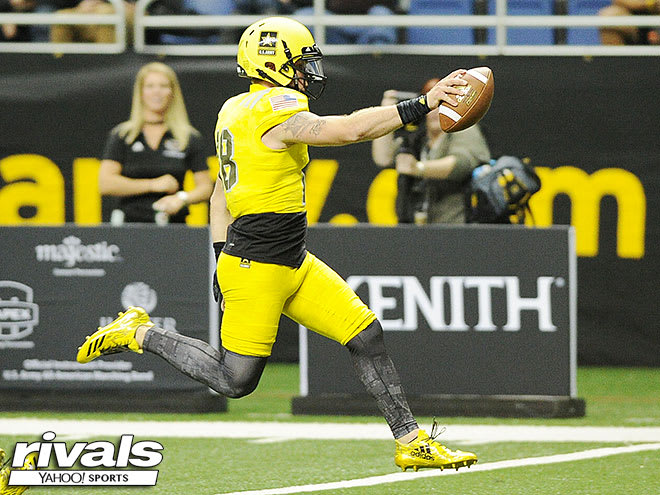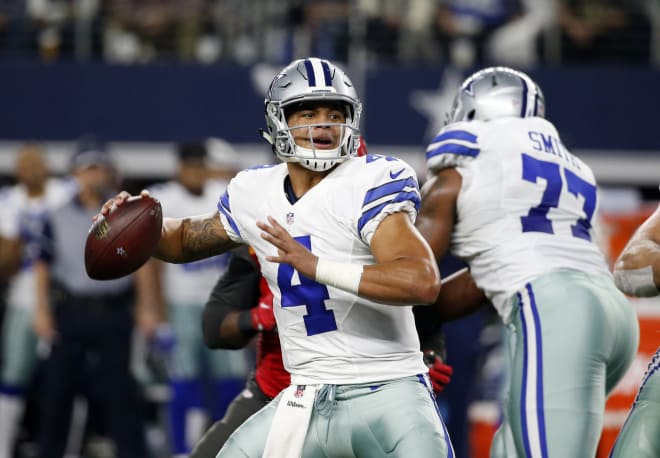Mental attributes outweigh physical skill when it comes to elite QBs
RELATED: Rivals Camp Series home | Recruiting news | Event award winners
What makes an elite quarterback?
Arm strength and other physical attributes are part of it, but Steve Clarkson, the quarterback coach who operates the Dreammaker quarterback events and assists with the Rivals 3 Stripe Camp presented by adidas, said mental makeup is the most important part.
And it’s probably not even close.
“It’s mostly mental,” Clarkson said. “Your whole approach to success is based on your mental makeup. It’s the ability to handle adversity and being able to think your way in and out of situations organically and seamlessly. Those are the ones who will make it to Sunday.
“You have to react and be extremely creative. You have to think about how to manipulate the scheme to your skill set and that’s a hard challenge for a lot of people. Most of the time, kids are not having schemes built for them. They have to adapt to an existing system so they have to make it that it becomes theirs. They have to own it. The way they own it is creatively figuring out ways where they can take advantage of the system that will feature their skill set.”
Clarkson points to Ohio State signee Tate Martell as a perfect example. The two have trained together since Martell has been in sixth grade.
The former four-star quarterback transferred high schools, ran every system possible and still excelled at the highest level. Martell finished his career never losing a game at Las Vegas Bishop Gorman and putting up huge numbers in the process.
For Clarkson, who has worked with Ben Roethlisberger, J.P. Losman, Ken Dorsey, Martell, Shea Patterson and countless others in more than 30 years of coaching quarterbacks, that is a shining example of the adaptation and creativity needed to excel at the position.

“He’s been able to get in and out of systems and adapt seamlessly,” Clarkson said. “Think about what he did at Bishop Gorman. A lot of times they were playing with tight ends and fullbacks or he was playing under center, he was playing shotgun, he ran the spread, he ran the pro, he did West Coast. He’s done it all.
“He and Shea Patterson are almost carbon copies of one another in terms of being able to fit any kind of system. Shea is a little taller but Tate, who stands at 5-11, plays like he’s 6-3. What he has, you can’t teach. The intangibles, you can’t teach.
“The guys who make it who are really great, you can’t teach. What Tom Brady has, there is no recipe for. There is no coach out there that develops that. That’s something that’s embedded in them from the word go. What we can do as coaches is we can enhance and point them in the direction of their strengths and try to protect them from their weaknesses but to get to that level you’ll have to work through and make yourself best in what you’re weak at. Once you go from coach A to coach B to coach C, somebody is not going to be able to take you where you want to go because they’ll just get somebody else to fit their system. You have to be savvy enough to know how is this going to work for me? Here’s what I’m good at, how can I take advantage of what I have based on my skill set?”
That is the difficult part from a coaching and scouting perspective, whether it’s trying to find high school quarterbacks for college or college QBs for the NFL.
Lots of guys put up huge numbers. Lots of guys move offenses up and down the field. But who has those special intangibles, along with that adaptability to change offenses or to quickly learn new things to go along with an extraordinary skill set to make himself special.
Clarkson points to the New York Jets as a prime example of how not to do it. Since 2013, the Jets have drafted West Virginia’s Geno Smith (second round), Clemson’s Tajh Boyd (sixth round), Baylor’s Bryce Petty (fourth round) and Penn State’s Christian Hackenberg (second round).
And to what end? The Jets still don’t have a proven, franchise quarterback and it’s because stats and big numbers are not always, if ever, a good predictor on future success especially when it comes to running NFL offenses. The Jets signed QB Josh McCown to a one-year deal on Monday.
“How many of those guys were top-tier players in high school to college and they never panned out?” Clarkson said. “They were all big-time college players but their skill set, their schematic, just doesn’t translate to the next level.
“Until (general managers and coaches) can understand that dynamic they’re going to continue to struggle and you see the recycled veterans have an opportunity to extend their careers because the younger guys just aren’t ready.”
Basically, Clarkson is saying this: To be a successful quarterback at the highest level, you have to adapt. You will have to constantly learn. Sitting back in shotgun and just tossing it around without the ability to read defenses – no matter your stats – will not cut it especially in the pros.

There are plenty of examples where this is true. Why did Jared Goff struggle in his rookie season? Because he had difficulty adapting from college ball to the NFL, the intricacies of defenses and working under center. If Goff grows, he can be a successful pro QB. If not, things might not work out.
A more positive example is Dak Prescott. The former three-star prospect went to Mississippi State and put up huge numbers.
Then came the NFL Draft where Goff, Carson Wentz, Paxton Lynch, Hackenberg, Jacoby Brissett, Cody Kessler and Connor Cook were all drafted before Prescott.
The former Mississippi State star went in the fourth round, No. 135 overall, to the Dallas Cowboys. According to numerous reports, Cowboys owner Jerry Jones tried all kinds of maneuvering to trade up for another quarterback but had no success.
After injuries to Kellen Moore and then Tony Romo, Prescott took over – adapted to his new role – and led the Cowboys to a 13-4 record and a playoff berth in his first season.
It was a surprise to many – except his former coach in Starkville.
“Dan Mullen had told me Dak Prescott, forget the scheme they were running, he was pro-ready,” Clarkson said. “From a very early age, (Prescott) was just different from other guys he had worked with. Had it not been for some off-the-field issues where there were some questions, he’d probably have been drafted where Paxton Lynch went, somewhere in the back half of the first round.”
Instead he fell to the fourth round. But Prescott adapted. He grew and learned and changed into a better quarterback.
As the saying goes: Adapt or die. In the unforgiving world of being a top-rated quarterback, it’s never been truer.
